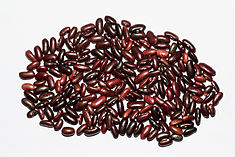Kidney beans

Uncooked red kidney beans
|
|
| Nutritional value per 100 g (3.5 oz) | |
|---|---|
| Energy | 532 kJ (127 kcal) |
|
22.8 g
|
|
| Sugars | 0.32 g |
| Dietary fiber | 7.4 g |
|
0.50 g
|
|
|
8.67 g
|
|
| Vitamins | |
| Thiamine (B1) |
(14%)
0.16 mg |
| Riboflavin (B2) |
(5%)
0.058 mg |
| Niacin (B3) |
(4%)
0.578 mg |
| Vitamin B6 |
(9%)
0.12 mg |
| Folate (B9) |
(33%)
130 μg |
| Vitamin C |
(1%)
1.2 mg |
| Vitamin E |
(0%)
0.03 mg |
| Vitamin K |
(8%)
8.4 μg |
| Minerals | |
| Calcium |
(3%)
28 mg |
| Iron |
(23%)
2.94 mg |
| Magnesium |
(13%)
45 mg |
| Phosphorus |
(20%)
142 mg |
| Potassium |
(9%)
403 mg |
| Sodium |
(0%)
2 mg |
| Zinc |
(11%)
1.07 mg |
| Other constituents | |
| Water | 66.94 |
|
|
|
|
|
| Percentages are roughly approximated using US recommendations for adults. Source: USDA Nutrient Database |
|
The kidney bean is a variety of the common bean (Phaseolus vulgaris). It is named for its visual resemblance in shape and color to a kidney. Red kidney beans should not be confused with other red beans, such as adzuki beans.
There are different classifications of kidney beans, such as:
Red kidney beans are commonly used in chili con carne and are an integral part of the cuisine in northern regions of India, where the beans are known as rajma and are used in a dish of the same name. Red kidney beans are used in New Orleans and much of southern Louisiana for the classic Monday Creole dish of red beans and rice. The smaller, darker red beans are also used, particularly in Louisiana families with a recent Caribbean heritage. Small kidney beans used in La Rioja, Spain, are called caparrones. In the Netherlands and Indonesia, kidney beans are usually served as soup called brenebon.
Raw kidney beans contain relatively high amounts of phytohemagglutinin, and thus are more toxic than most other bean varieties if not pre-soaked and subsequently heated to the boiling point for at least 10 minutes. The US Food and Drug Administration recommends boiling for 30 minutes to ensure they reach a sufficient temperature long enough to completely destroy the toxin. Cooking at the lower temperature of 80 °C (176 °F), such as in a slow cooker, can increase this danger and raise the toxin concentration up to fivefold. Canned red kidney beans, though, are safe to use immediately.
...
Wikipedia
